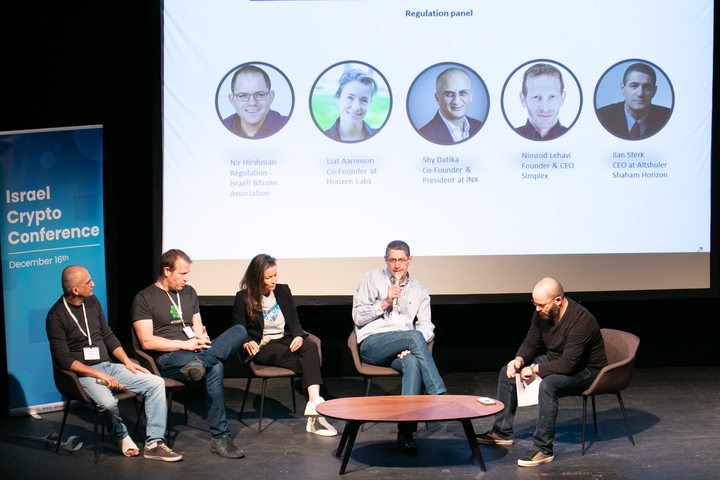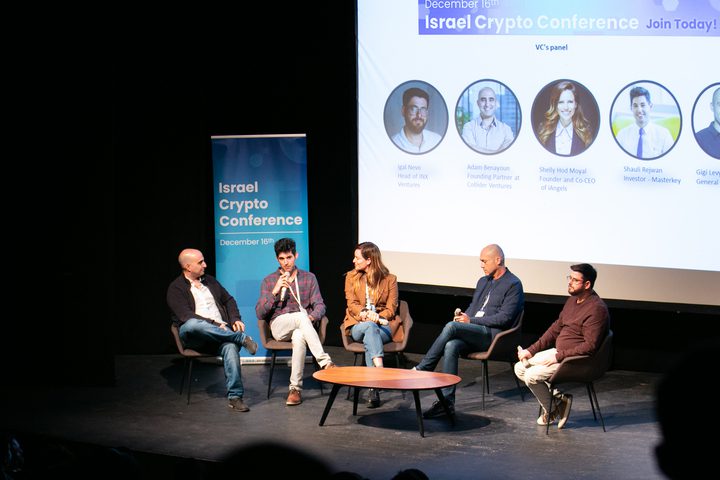BeInCrypto is proud to be a media partner of the Israel Crypto Conference, held in Tel Aviv on December 16, 2021, with over 650 attendees in a sold-out event.
(Editor’s note: Click here to read the first part of this article series.)
Crypto tech is up and running in Israel and during Israel Crypto Conference held last month, we talked with more key industry figures in the event. Here are a few snippets:
A conversation with Liat Aaronson Co-Founder, Chief Operating Officer at Horizen Labs
Why was it important to build this product (Zendoo) for developers? How has it pushed creation in the crypto space?
Liat: Developers are the lifeblood of the crypto ecosystem. The success of any blockchain network depends almost entirely on its ability to foster a vibrant developer community. At Horizen, we aim to deliver products that are developer-focused in order to encourage organic growth of our ecosystem. Developers will naturally bring about the creation of new applications, tokens, tools, exchanges etc., all of which are essential for attracting a critical mass of end users and wide adoption.
Zendoo is a sidechain protocol that gives developers complete control over the type of blockchain they want to design. They can optimize their network for speed, privacy, and decentralization, all with the freedom to choose their own consensus mechanism and design their own token issuance and incentive models.
Such customization is one of Zendoo’s key value-adds. In addition, each sidechain joins the Zero-Knowledge enabled network of blockchains on the Horizen main blockchain.
What has been the biggest challenge when growing and building in this space?
Liat: Because our industry is formed from the bottom-up and very decentralized, one of the biggest challenges to building and growing in this space is the lack of standardization of developer tools or even industry terminology. We see a convergence of interoperability as a solution to this challenge.
Is your work open source? Can you give an example of the ideal company and scenario that would use your solution?
Liat: The Horizen network is built using open source technology.
The ideal company that would work on the Horizen network would be one looking for blockchain solutions that are customizable, privacy-enhancing, and secure.
Horizen Labs, the equity-funded spin-off of Horizen was created to build the technology and tools to help streamline usage with generalizable products and specialized services. Horizen Labs has partnered with many industry players and design partners.
One of our pioneer use cases for optimizing transparency while maintaining specific data privacy is with Celsius Network, a leading peer-to-peer crypto lending company. Horizen Labs built the zkAudit solution to securely verify proof of reserves in near real-time without revealing identifiable information or relying on costly third-party auditors. Celsius is the design partner for this endeavor, but there is a pipeline of other companies waiting to onboard.
Quick chat with Nir Zyskind Director of BD and Ops SCRT Labs
Privacy networks have had controversy in the past, why are they important and worth building?
Nir: Generally, Blockchain is a robust decentralized cloud, which apps can be built on. However, all the data is public, which means nobody would build data-sensitive apps on it. Secret network is the first blockchain with privacy by default for smart contracts. it uses novel data-privacy technology to ensure the sensitive data won’t be public.
Do you think the future of blockchains is privacy or transparency or both?
Nir: I think both. Privacy is highly important for sensitive data. let’s take Secret NFTs for example- Quentin Tarantino wanted to share his never seen before scenes from his handwritten script, but wanted to give real ownership to the purchaser, the only way to achieve this kind of goal is using the secret network, and that’s one of the things he really liked. In some other cases you might want to view, share or publish data.
A conversation with Nir Hirshman, Israeli Bitcoin Association
What is the goal of the Israeli Bitcoin Association?
Nir: The Israeli Bitcoin Association started operating in 2011 and was officially founded in 2013 by Meni Rosenfeld and Ron Gross. The Israeli Bitcoin Association is a non-profit organization with the goal of helping the people in Israel make the most of the technology of Bitcoin and other cryptocurrencies.
The Association’s areas of activity are Working with Israeli authorities to create a regulatory framework for Bitcoin activity, that will allow trade, commerce, and usage of Bitcoin while minimizing the risk of abuse, Creating awareness towards Bitcoin, disseminating accurate information and education, providing support and guidance to users and helping newcomers with their first steps, Cultivating the Israeli Bitcoin community in Israel, by supporting online community hubs and organizing a wide variety of meetups, lectures, conferences and social events, Supporting businesses and start-ups who want to use Bitcoin, or develop products, services and technologies that advance it.
Why is having a regulatory framework for activity in Bitcoin a good idea?
Nir: Bitcoin is a new kind of money, only better. And money needs a legal framework to operate within it. There is something romantic about anonymous programmers developing technology in the garage, but bitcoin and cryptocurrencies have long since passed this stage. Today our eyes should be set on mainstream adoption.
We should allow as many people as possible to take part in this revolution, and that can happen by creating a regulatory framework. Needless to say, rules are not just restrictive. Rules also protect the weak, prevent abuse and provide a safety net even for those who are not professionals in the field. For Bitcoin to grow, we need to bring the masses in and not just the early adaptors, and this path goes through the creation of defined rules.
What kind of advocacy work do you do in the Bitcoin community? Can you give working examples? Why is this important?
Nir: Just as in the early 1990s it was said on the internet that this is where a recipe for a bomb can be obtained, so there are quite a few FUD traders who create unnecessary hysteria, and the authorities sometimes fall into the trap of this propaganda.
The Israeli Bitcoin Association has a long series of achievements over the years in fighting barriers and creating a strong business environment: Due to our opposition to the proposition of obligatory reporting of assets in digital currency, as part of the state budget, it ended up being withdrawn.
Money laundering prevention order, which was a major part of preventing banks from blocking money transfers originated from cryptocurrency, enacted and amended upon the request of member companies that we represented, Mandatory VAT on cryptocurrency purchases was withdrawn as well, and Mandatory income tax withholding for digital currency – did not take effect.
In practice, regulation can help, but it can also destroy entire industries. Our place as the Bitcoin Association is to bring the knowledge to the decision-makers and show them how things look for the industry and users in the day to day reality, and make them understand that this is one of the most significant and positive technological revolutions of the current century,
we emphasize to them that if Israel wants to continue to be a leading force in the global high tech industry, it must adopt Bitcoin and distributed digital currencies.
What support do you provide to businesses and start-ups interested in using Bitcoin or developing products, services and technologies that promote it? Can you give working examples?
Nir: The goal of the Israeli Bitcoin Association is to make knowledge accessible and support the community. The association supports the Bitcoin Embassy, where ambassadors volunteer to support newcomers in the field and provide assistance.
The association supports hackathons, social events and above all creates a supportive and vibrant community that allows start-up companies to thrive. We also work with the media and with decision-makers to promote the Israeli ecosystem and remove regulatory barriers.

Recently, the association decided to establish the Israeli Bitcoin association Companies forum, which aims to represent the interest of the industry, and enable convenient and simple business operations in Israel. In fact, these are growth companies, and if they do not have the ability to operate smoothly, they simply will not be here. These are not heavy industry factories, these are brilliant minds with laptops who can relocate anytime. And our goal as the Israeli Bitcoin association is to preserve them here in Israel.
In terms of regulation, where is Israel in comparison with other countries? Where does Israel need to catch up? In what cases is it a leader?
Israel is currently in a good place in the middle. With the passage of the money laundering prevention order that came into effect in November, the Israeli business environment has changed for the better. However, we are still in an environment of regulatory uncertainty. One of our goals as an association is to stabilize this environment and make sure there are no rapid changes.
A regulatory framework helps everyone and keeps the bad players out of the market. But we must make sure that when we make the necessary adjustments we do it without spilling the baby with the bathwater, and continue to allow the brilliant minds and the great companies that grew here, to operate here freely, so that they will be able to compete in the global industry.
Disclaimer
All the information contained on our website is published in good faith and for general information purposes only. Any action the reader takes upon the information found on our website is strictly at their own risk.


